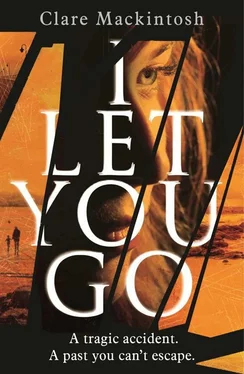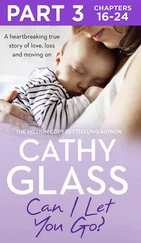Bethan is still looking at the landscapes I have taken of the bay. ‘I mean it, Jenna, they’re lovely photographs. Are you going to sell them?’
I almost laugh, but she isn’t smiling and I realise it is a serious suggestion.
I wonder if it might be possible. Perhaps not these – I’m still practising, still getting the lighting right – but if I work on them … ‘Maybe,’ I say, surprising myself.
Bethan scrolls through the remaining photographs, laughing when she comes across her own name written in the sand.
‘It’s me!’
I flush. ‘I was trying something out.’
‘I love it – can I buy it?’ Bethan holds up the camera and admires the photograph again.
‘Don’t be silly,’ I say. ‘I’ll get it printed for you. It’s the least I can do: you’ve been so kind.’
‘The Post Office in the village has one of those machines where you can print them yourself,’ Bethan says. ‘I’d love this one, with my name, and this one here – where the tide is out.’ She has chosen one of my favourites: I took it in the evening, as the sun was sinking beneath the horizon. The sea is almost flat, a shimmering mirror of pink and orange, and the surrounding cliffs nothing more than smooth silhouettes on either side.
‘I’ll get them done this afternoon.’
‘Thank you,’ Bethan says. She puts the camera firmly on the side and turns to face me, her no-nonsense look already familiar to me. ‘Now, let me do something for you.’
‘There’s no need,’ I begin, ‘you’ve already—’
Bethan waves away my protestations. ‘I’ve been having a sort-out, and there are a few things I need to get rid of.’ She gestures to two black sacks sitting neatly by the door. ‘Nothing exciting: cushions and throws from when we redid the static caravans, and some clothes that will never fit me again even if I gave up chocolate for the rest of my life. Not fancy stuff – there’s not much call for ball gowns in Penfach – but some jumpers and jeans and a couple of dresses I should never have bought.’
‘Bethan, you can’t give me your clothes!’
‘Why on earth not?’
‘Because…’
She looks me straight in the eye and I trail off. She’s so matter-of-fact I can’t feel embarrassed, and I can’t keep wearing the same things day in, day out.
‘Look, it’s only stuff I’ll end up taking to the charity shop. Have a sift through and take what you can use. It’s common sense, isn’t it?’
I leave the caravan park laden with warm clothes and a bag of what Bethan calls ‘home comforts’. Back in the cottage I spread them all out on the floor like Christmas presents. The jeans are a little too big, but will be fine with a belt, and I almost weep at the softness of the thick fleece jumper she has put by for me. The cottage is freezing and I’m permanently cold. The few clothes I brought with me from Bristol – I realise I have stopped calling it ‘home’ – are worn and stiff from salt, and from washing by hand in the bathtub.
It’s Bethan’s ‘home comforts’ I am most excited by. I drape the battered sofa with an enormous patchwork bedspread in bright reds and greens, and immediately the room feels warmer and more welcoming. On the mantel is a collection of stones I gathered from the beach, polished smooth by the sea: I add to these a vase from Bethan’s thrift-shop bag, and decide to collect some willow stems for it this afternoon. The promised cushions go on the floor, next to the fire, where I habitually sit to read or to edit my photographs. At the bottom of the bag I find two towels, a bathmat and another throw.
I don’t believe for a second that Bethan was throwing all these things out, but I know her well enough not to query it.
There’s a knock on the door and I stop what I’m doing. Bethan told me that Iestyn would be coming by today, but I wait for a moment, just in case.
‘You in there, then?’
I pull back the bolt to open the door. Iestyn acknowledges me with his habitual gruffness, and I welcome him warmly. What I had at first taken for dismissal, even rudeness, I have come to realise is simply the hallmark of a man who keeps himself to himself, worrying more about the welfare of his goats than the sensibilities of his kinfolk.
‘I brought you some logs,’ he says, indicating the firewood stacked haphazardly in the trailer attached to his quad bike. ‘Can’t have you running out. I’ll bring them in for you.’
‘Can I make you a cup of tea?’
‘Two sugars,’ Iestyn shouts over his shoulder, as he strides back to the trailer. He begins piling logs into a bucket, and I put the kettle on.
‘What do I owe you for the logs?’ I ask, when we are sitting at the kitchen table drinking tea.
Iestyn shakes his head. ‘It’s odds and ends left over from a load I had. It’s not good enough to sell.’
The wood he has stacked neatly by the fire will last for a month at least. I suspect Bethan’s hand again, but I’m in no position to refuse such a generous gift. I must think of a way to repay him, and Bethan too.
Iestyn shrugs off my thanks. ‘I wouldn’t have recognised the place,’ he says, looking around at the colourful throw and the collections of shells and reclaimed treasures. ‘How’s the range been? Not played you up too much?’ He indicates the ancient Aga. ‘They can be tricky buggers.’
‘It’s been fine, thank you.’ I suppress a smile. I’ve become an old hand now; coaxing the range into life again within minutes. It’s a small success, but I store it away with the others, stacking them up as though they might one day cancel out the failures.
‘Well, I must be going,’ Iestyn says. ‘The family’s coming this weekend and you’d think they were royalty, the amount Glynis has been flapping. I told her, they don’t care if the house is clean or there are flowers in the dining room, but she wants everything right for them.’ He rolls his eyes in apparent exasperation, but his tone is soft as he speaks about his wife.
‘Is it your children visiting?’ I ask him.
‘Both daughters,’ he says, ‘with their husbands and the little ones. It’ll be a squeeze, but nobody minds when it’s family, do they?’ He bids me goodbye and I watch his quad bike bounce across the uneven ground.
I shut the door and stand there, looking at the cottage. The sitting room, which just a moment ago seemed so cosy and welcoming, now feels empty. I imagine a child – my child – playing on the rug in front of the fire. I think of Eve, and the niece and nephew growing up without me in their lives. I may have lost my son, but I still have a family, no matter what happened between us.
I got on well with Eve when we were children, despite the four-year age gap between us. I looked up to Eve, and in turn she cared for me, seeming never to resent her baby sister tagging along. We were quite different; me with my unruly auburn mop, and Eve with poker-straight mouse-brown hair. We both did well at school, but Eve was more diligent than me, burying her head in a textbook long after I had flung my own across the room. Instead I spent hours in the art studio at school, or on the floor of the garage – the only part of our home where my mother allowed me to pull out my clay and paints. My fastidious sister would turn her nose up at such pursuits, squealing as she ran away from my outstretched arms, splattered with wet clay. ‘Lady Eve’, I called her one day, and the name stuck, long after we had grown up and built our own families. Eve secretly enjoyed the moniker, I always thought, as over the years I watched her take compliments for a wonderful dinner party, or beautiful gift-wrapping.
We weren’t as close after Dad left. I could never forgive our mother for driving him away, and didn’t understand how Eve could do so. Nevertheless I miss my sister desperately, now more than ever. Five years of someone’s life is too much to lose over a throwaway comment.
Читать дальше












